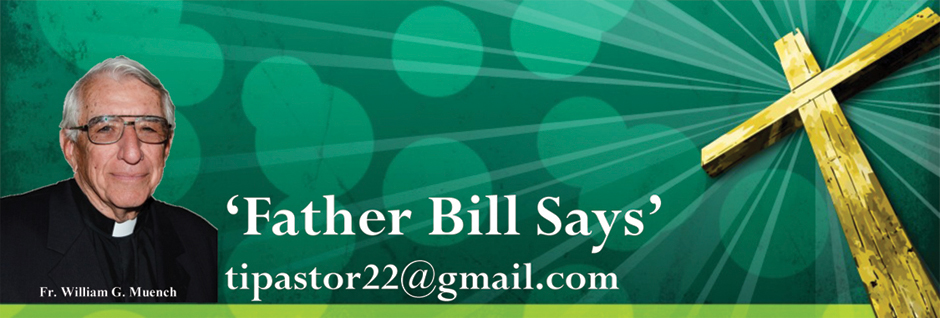Nov. 16, 2022 By Father William Muench During the month of November, we are rushing toward the end of the Catholic liturgical year. Our liturgical year ends with the Sunday Feast Day of Christ the King. Then we begin the new Liturgical Year with the time of Advent, our preparation for Christmas. Today, I believe this is a good time to remember what we mean when we talk about being Church, our Catholic Church. Each day as we pause to pray as the Church, we must unite ourselves to our Lord Jesus. This month, we celebrate Jesus as Christ the King. We dedicate ourselves to our Lord by making him our King – the King of our life – so we ask him to be our leader, our guide, our king each day. You and I don’t talk about kings here in our country. Now, I do know that some make a person the king in sports or in music or something like that. When we talk about our Church leaders, we refer to our pope or our bishops. However, as Church, we find our strength and power in the Lord Jesus, our Lord and Savior. On this feast day, we pay honor to our Lord by announcing to the world that Jesus is our king. I want to use this feast day as an opportunity to remember what it means when we say that we are Church, the Church of Jesus Christ. For me, I believe that we must go back to the Second Vatican Council, especially the Dogmatic Constitution on the Church (Lumen Gentium). This document begins by reminding us that as Church we are the people of God. In this regard, here is a sentence from this document: “At all times and in every race, anyone who fears God and does what is right has been acceptable to God. He has, however, willed to make all holy and save them, not as individuals without any bond or link between them but rather uniting them as a people who might acknowledge them and save them in holiness.” We are a people, the People of God. This document of the council spends time to remind us that the Church is first the clergy, the priests and the bishops. The council teaches us that the eternal pastor set up the holy Church by entrusting the apostles with their mission as he himself had been sent by the Father. Jesus willed that their successors, the bishops namely, should be the shepherds in his Church until the end of the world. There is much more we could investigate about our clergy, but for now I would like to remind you of how the council emphasized the importance of the laity – you, lay men and lay women. The heart and soul of our Church is always the laity. The Church depends on the dedication and the evangelizing power of the laity. Each day, lay Catholics bring the message of our Savior, the message of our Church, to more people than the clergy is ever able to do so. I firmly believe that the Lord Jesus challenges all lay men and lay women, bringing into their lives opportunities to help another or to lead another closer to the Lord Jesus. The council writes this: “All the laity, then, have the exalted duty of working for the ever-greater spread of the divine plan of salvation to all, of every epoch and all over the earth.” All of this – this Catholic Church, this People of God – is a call to holiness for all peoples, all races, all cultures on this planet. Today, I finish with one more sentence from this Constitution: “It is therefore quite clear that all Christians in any state or walk of life are called to the fullness of Christian life and to the perfection of love, and by this holiness a more human manner of life is fostered in the earthly society.” |
||||


